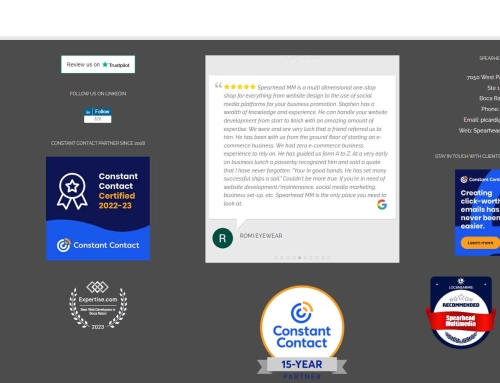In fact, social media marketing requires a lot of patience and maintenance. Once you’ve established your social media presence and are generating engagement and measuring your ROI, the most important stage is to protect your hard work. Companies well-versed in social media marketing have taken all these steps to grow and establish their brand’s online presence, but are they doing enough to protect it? Monitoring and protecting your social media presence from decline or extinction is just as pivotal as demonstrating it in the first place.
Every company that engages in social media marketing needs to uphold a strong and credible reputation while looking for ways to continuously improve it. Controversial posts, account hacks, and inadvertent mistakes are all examples of threats that could harm your brand’s reputation. Luckily for marketers, many of these troubling factors are avoidable or correctable. To protect your social media reputation, you must have a careful eye for potential problems, a plan for handling crises, and a team you trust to write and manage the content. Here are three common mistakes that plague social media marketers and the best ways to avoid them:
1. Unsupervised Content Publishing
Imagine a situation where multiple employees have access to your corporate social accounts and one member accidently posts an image with poor taste that was meant to go on their personal profile. If you have a large and distributed social media team, an incident like this is more likely to occur and will require major damage control. In fact, something very similar happened to US Airways when their employee inadvertently tweeted an inappropriate image as a response to a customer complaint. This reply went out from the company’s official Twitter account, and worse, it stayed up for over an hour before being deleted! By the time US Airways apologized, it was too late and the damage had been done.
One way to prevent this from happening is by controlling the roles and permissions of your social media accounts. For example, Facebook allows you to assign different roles to different employees including admin, editor, moderator, advertiser, and analyst. Simply go to your Facebook Business Manager page and follow the steps listed. For Twitter, you can use the “Teams” feature on TweetDeck to control who can be granted access as an owner, admin, or a contributor. For LinkedIn, another popular social platform, there are limited options for managing team roles—either you’re an admin or not—but you can avoid posting mishaps by only granting admin roles to select members in your team.
If you’re looking to take the level of security a step higher, consider adopting a social media management platform that will allow you to manage highly distributed social media teams and protect your data. This way, you’ll ensure that each employee has the level of access necessary for their role (e.g. administrator, contributor, or editor) and prevent employees from posting content that falls outside of corporate guidelines.
2. Controversial Content
Even if you’ve avoided personal content from being shared with your company’s followers, there’s still a possibility that controversial content will slip through the cracks. For example, if you’re using artificial intelligence, then things can get ugly. This is a lesson that Microsoft quickly learned after their newly launched A.I. bot “Tay” was shut down after making offensive and racist statements.
But since a situation like this isn’t likely to happen to everyone, it is, at the very least, imperative that social media managers understand right from wrong when it comes to writing and posting content, which should not be offensive or incite a damaging reputation. Those who manage social media should also be trained on handling negative mentions, aggressive commenters, or unhappy customers so they are prepared for whatever comes their way. It’s also a good idea to create a social media escalation policy to indicate who should respond and how for these unique situations.
3. Account Hacks
Online hacking has become a sharper reality on social media. It can also have adverse effects on all strides a company has made in trying to portray a positive brand image and engaging potential and existing customers. That’s why you need to tightly guard your social accounts by implementing some of these simple tricks:
- Keep your passwords complex and frequently change them. This is especially important after an employee who had access leaves the company. A simple trick to creating robust passwords is to turn letters into look-alike numbers or symbols, for example ‘O’ can become the number ‘0’ and an ‘a’ can become an ‘@’ sign.
- Review social media platforms’ privacy settings. Keep an eye out for blogs published by Twitter, LinkedIn, and Facebook to stay on top of their new updates.
- Turn on notifications to be alerted about suspicious activity. Implementing a system like LogDog will ensure that your Facebook and Twitter profiles are constantly monitored for suspicious activity such as hacking or identity theft. In case something does happen, they will immediately alert you so you’re ready to take action.
Following the general guidelines of a smart social media strategy will help you create safe content that engages your audience, leads them to a solution you’re offering, and forges the essential relationship for generating sales. The founding rule of social media marketing is to expand your reach and communicate your company’s core message. By sticking to these values and implementing an effective strategy, you can protect your social media reputation and ensure it doesn’t decrease or spin out of control.
Have you ever had a social media crisis? How did you recover? I’d love to hear in the comments below.















Just wondered if you read any SEO agencies? I can never find useful help which can be used in a practical sense
Added to StumbleUpon, they would find this useful!
I read https://www.searchenginenews.com/ as well as http://searchengineland.com/ to try to keep up with the latest changes.
[…] Related: How to Protect Your Company’s Reputation on Social Media […]
[…] How to Protect your Company’s Reputation on Social Media […]